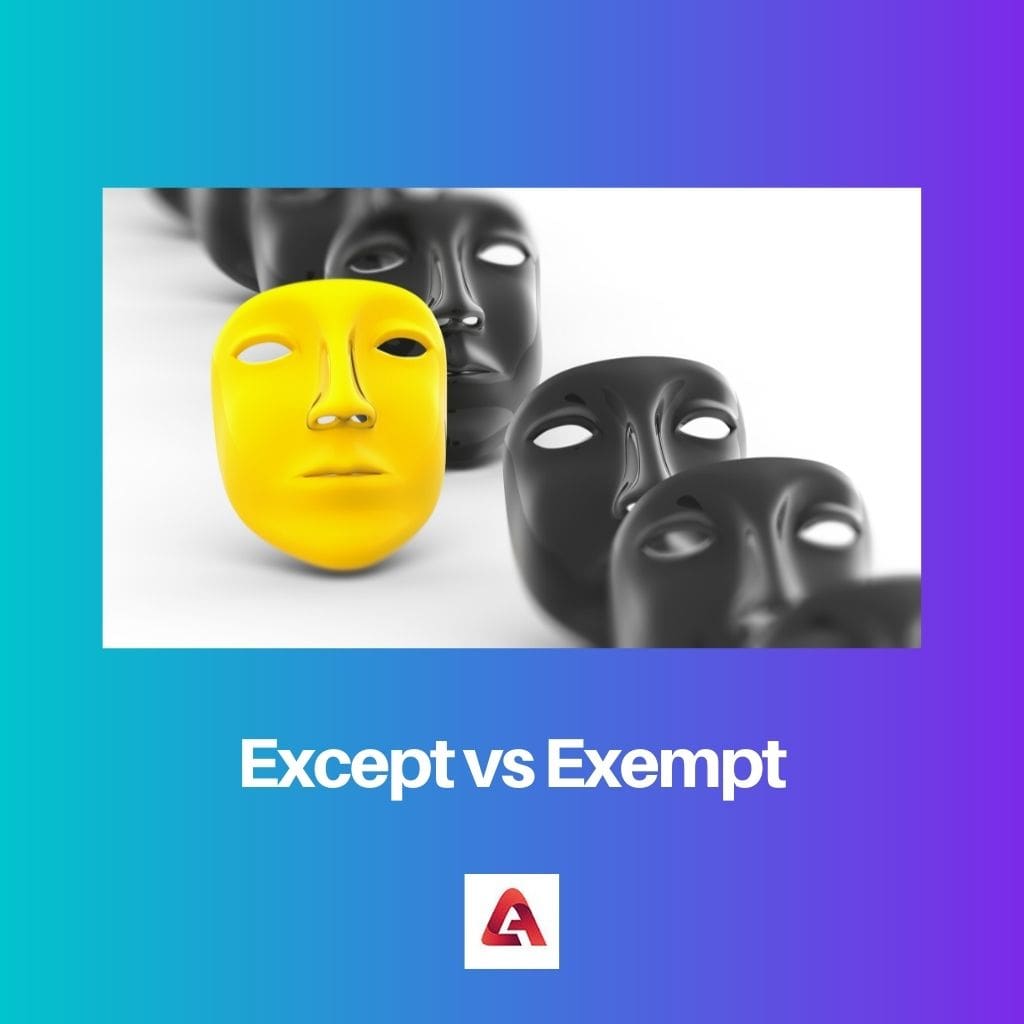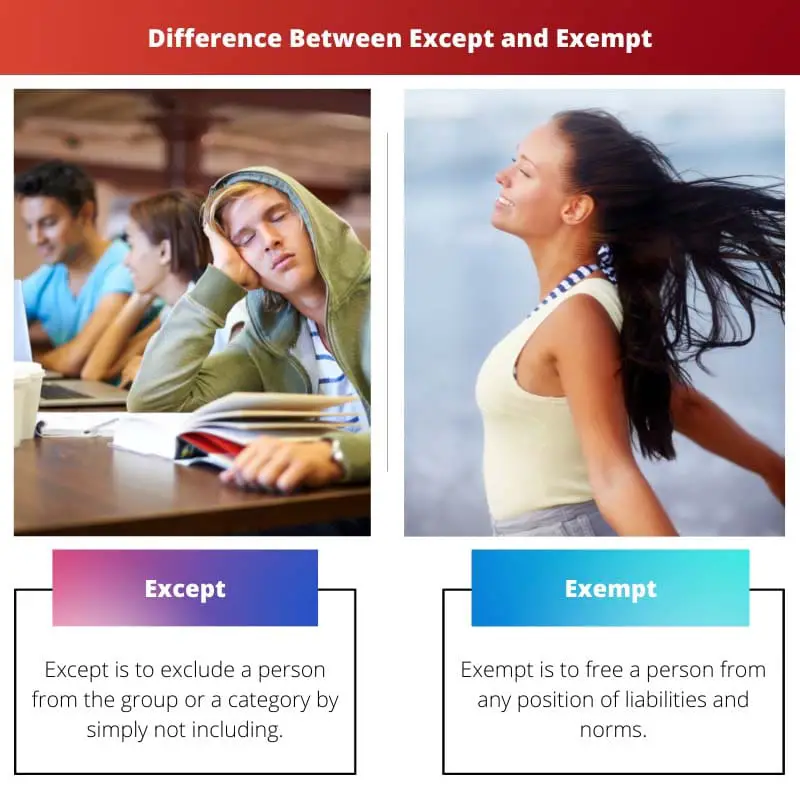“Except” is a preposition or conjunction used to introduce a clause indicating something excluded from a general statement. For example, “Everyone except Sarah attended the meeting.”
“Exempt” is an adjective that describes something or someone not subject to a particular rule, requirement, or duty. For instance, “Students with medical conditions may be exempt from physical education classes.”
Key Takeaways
- Except is a preposition or conjunction used to indicate exclusion or exception; exempt is an adjective or verb free from an obligation, duty, or liability.
- Except is used to show that something does not apply to a specific item or group; exempt indicates that an individual or entity is not subject to a particular rule or requirement.
- Both except and exempt involve exclusion, but except identifies excluded items or circumstances, while exempt describes freedom from obligation or liability.
Except vs Exempt
The difference between except and exempt is that except means to be excluded from a group or a category or simply not including, whereas exempt means to free (an organization or a person) from pre-imposed rules and obligations.

Let us understand it more clearly with the help of an example: The tuition fees to school cost $20,000. Now,
- If you can’t afford to pay the entire fees, the school gives you an ‘exception’ of financial aid and lets you pay only $10,000 (here you are not exempted because you are paying something)
- If you are a child of a teacher teaching in the same school, then the school ‘exempts’ you from paying any fees and lets you study without any payment of fees.
The following illustrations can better understand the two words:
Comparison Table
| Feature | Except | Exempt |
|---|---|---|
| Meaning | To exclude something from a group or rule | To be officially relieved from an obligation or duty |
| Emphasis | On the exclusion from a general category | On the freedom from an obligation |
| Part of speech | Preposition | Adjective |
| Common usage | Often used with a preposition (“except for”) | Often used with the verb “to be” (“are exempt”) |
| Examples | * “Everyone except Sarah went to the party.” (Sarah is excluded from the group who went to the party) * “We only accept applications except for those with specific experience.” (Applications without specific experience are excluded) | * “Senior citizens are exempt from paying taxes.” (Senior citizens are officially relieved from the duty of paying taxes) * “Certain goods are exempt from import duties.” (Certain goods are officially free from import duties) |
What is Except?
Overview:
“Except” is a versatile term commonly used in English grammar as both a preposition and a conjunction. It plays a crucial role in indicating exclusions or exceptions within sentences. Understanding its various uses is essential for clear and precise communication.
Preposition:
As a preposition, “except” is used to specify something excluded from a general statement or category. It introduces a noun or noun phrase representing what is excluded.
Example:
- “All the guests enjoyed the party except John, who had to leave early.”
In this sentence, “except John” specifies that John is the only person who did not enjoy the party.
Conjunction:
“Except” also functions as a conjunction to introduce a subordinate clause that presents an exception to the main clause. It connects two clauses, with the second clause stating the exception to the first clause.
Example:
- “I would have finished my homework on time, except that I fell asleep.”
Here, the phrase “except that I fell asleep” explains the reason for not completing the homework on time, serving as an exception to the main clause.
Sentence Structure:
When using “except” in a sentence, it is essential to maintain clarity by clearly identifying what is being excluded or the exception being stated. Proper punctuation and sentence structure help ensure that the intended meaning is conveyed effectively.

What is Exempt?
Overview:
“Exempt” is an adjective used to describe something or someone that is not subject to a particular rule, requirement, duty, or obligation. Understanding the concept of exemption is essential in various contexts, such as law, taxation, regulations, and organizational policies.
Legal and Regulatory Context:
In legal and regulatory contexts, “exempt” refers to individuals, entities, or activities that are excluded from certain laws, regulations, or requirements. This exclusion may be based on specific criteria established by authorities or governing bodies.
Example:
- “Small businesses with annual revenue below a certain threshold may be exempt from paying certain taxes.”
Here, “exempt” indicates that small businesses meeting the specified criteria are not required to pay the mentioned taxes.
Taxation:
In taxation, “exempt” denotes income, transactions, or entities that are not subject to taxation. This can include tax-exempt organizations, income exemptions for certain individuals, or exemptions for specific types of transactions.
Example:
- “Charitable organizations are often exempt from paying income tax on donations they receive.”
In this case, “exempt” highlights the exemption granted to charitable organizations regarding income tax on donations.
Organizational Policies:
Within organizations, “exempt” may refer to employees who are not eligible for overtime pay under labor laws or collective bargaining agreements. These employees are typically classified as exempt based on their job duties and salary level.
Example:
- “Managers and executives are often classified as exempt employees and are not entitled to overtime pay.”
Here, “exempt” describes the employment status of managers and executives, indicating their exemption from overtime pay eligibility.

Main Differences Between Except and Exempt
- Here are the main differences between “except” and “exempt” in a bullet point list:
- Function:
- “Except” is primarily used as a preposition or conjunction to indicate exclusion or exception within a sentence.
- “Exempt” is an adjective used to describe something or someone not subject to a particular rule, requirement, duty, or obligation.
- Usage:
- “Except” is used to specify something excluded from a general statement or category, introducing a noun or noun phrase representing what is excluded.
- “Exempt” is used to describe individuals, entities, income, transactions, or activities excluded from laws, regulations, taxes, or obligations.
- Examples:
- Example of “except”: “All the students passed the exam except for Jane, who failed.”
- Example of “exempt”: “Charitable organizations are exempt from paying income tax on donations.”
- Part of Speech:
- “Except” can function as both a preposition and a conjunction within a sentence.
- “Exempt” is solely an adjective used to describe the exemption status of something or someone.
- Context:
- “Except” is commonly used in everyday language to specify exclusions or exceptions in various contexts.
- “Exempt” is often encountered in legal, financial, and organizational contexts, particularly in discussions related to laws, regulations, taxes, and obligations.

- https://www.merriam-webster.com/dictionary/except
- https://dictionary.cambridge.org/dictionary/english/exempt

I found this post to be both enlightening and engaging. The comparison table is particularly helpful in highlighting the disparities between ‘except’ and ‘exempt’.
I’m glad I’m not the only one who found the comparison table to be extremely useful.
The examples provided are superb! They really solidify the contrasting meanings of ‘except’ and ‘exempt’.
I couldn’t agree more. Understanding these differences is key in enhancing one’s language skills.
Absolutely, Madams. This is a great resource.
This was a delightful and enlightening read. I appreciate the author’s meticulous elucidation of the differences between ‘except’ and ‘exempt’.
Completely agree, Smurphy. This was a wonderful article.
Couldn’t have said it better myself, Smurphy.
This article gives a comprehensive understanding of both ‘except’ and ‘exempt’. It’s extremely helpful for those looking to improve their vocabulary.
I completely agree. I’ve learned a lot from this post.
The distinction between ‘except’ and ‘exempt’ is accentuated elegantly in this piece. It certainly deepened my understanding of both terms.
Definitely, Kennedy. I’m grateful for the clarity provided in this article.
I couldn’t agree more, Kennedy. This is an exceptional piece of writing.
The breakdown of ‘except’ and ‘exempt’ is undoubtedly meticulous and informative. It’s a must-read for those who value precision in their language usage.
Absolutely, Mstewart. I’ve shared this with my friends. It’s too good not to.
I completely agree, Mstewart. I’ve bookmarked this article for future reference.
I’m not convinced that distinguishing between ‘except’ and ‘exempt’ is particularly valuable. They seem synonymous in many contexts.
I understand your skepticism, Elsie, but I believe this piece sheds light on the importance of these nuances.
Respectfully, I disagree. The subtle differences are crucial for precise communication in writing.
Honestly, I’ve never thought about the distinction between ‘except’ and ‘exempt’ before. This post really opened my eyes to the differences!
Agreed, Rogers! I’m glad I read this.
I know, I feel the same way. It’s a great educational piece.
The author’s elucidation of ‘except’ and ‘exempt’ is impressive. It’s certainly a valuable resource for language enthusiasts.
Absolutely, Young Lexi. I’ve learned a great deal from this post.
This is a fantastic breakdown of the differences between these two words! Very clear and informative.
I agree, Tward! The example of the student paying partial tuition versus being exempt entirely is very helpful.